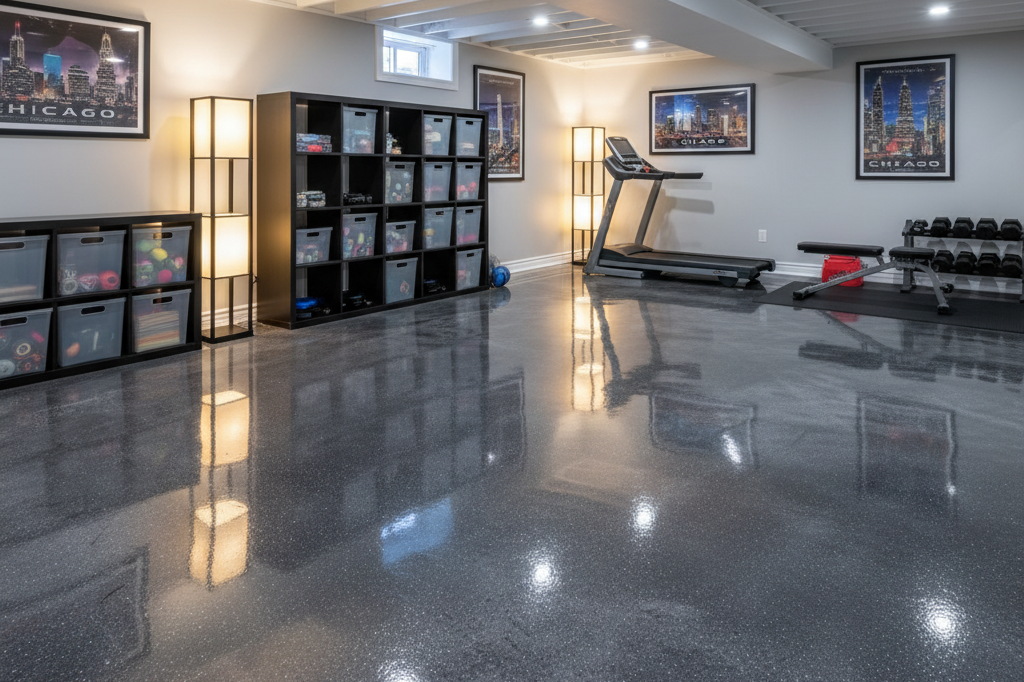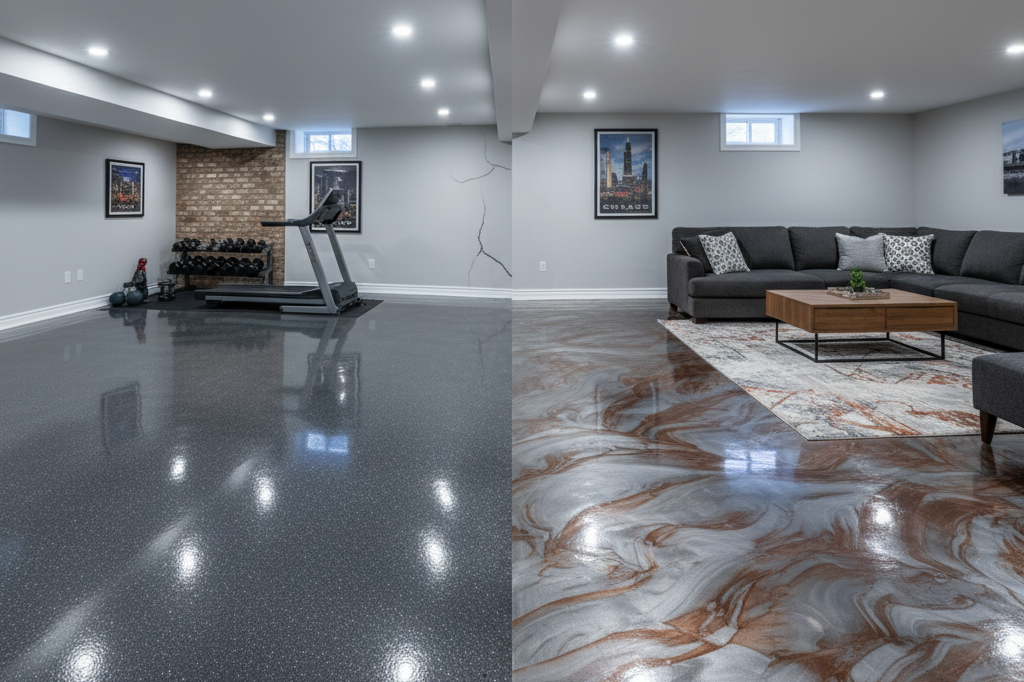If you live in Chicago, you already know how tricky basements can be. Humid summers, freezing winters, and constant moisture levels all take a toll on the concrete. Cracks start to form, the surface flakes, and moisture slowly works its way through the slab. Over time, that musty basement smell becomes a reminder that the space isn’t being used the way it could be.
That’s why more homeowners are upgrading their floors with systems built to handle Chicago’s conditions. Two of the most popular options are basement epoxy floor systems and custom floor coatings like polyurea or hybrid blends. Both can turn dull concrete into a cleaner, stronger, and more livable surface, but the best choice depends on your home’s moisture levels, age, and daily use. In this guide, you’ll learn how each coating performs and how to choose the one that delivers the best long-term results.
Understanding Chicago Basement Conditions

Basements in Chicago face challenges that homeowners in other regions rarely deal with. Many homes were built decades ago, long before modern waterproofing and sealing methods became standard. That means concrete floors often have tiny fractures, uneven surfaces, or spots where moisture naturally seeps upward from the ground.
Moisture is the biggest enemy of basement concrete. Even when basements don’t flood, humidity settles into the concrete slab. When temperatures drop, the freeze-thaw cycle can widen cracks and push water vapor upward. During summer, that moisture becomes trapped and creates a damp, sticky environment.
Another common issue is sub-surface movement. Chicago’s soil expands and contracts throughout the year, and that movement transfers directly into the basement floor. Over time, the concrete begins to show signs of stress—hairline cracks, surface pitting, and mineral deposits that collect on top.
All of these factors make choosing the right coating important. A good coating doesn’t just sit on the surface. It bonds deeply, resists moisture, and stays stable through seasonal changes. That’s why comparing a basement epoxy floor to more advanced custom floor coatings is such an important first step before starting any upgrade.
What Makes a Basement Epoxy Floor a Popular Choice?

Why homeowners choose epoxy for basement upgrades
For decades, epoxy has been one of the most reliable options for upgrading concrete floors. It’s durable, visually clean, and capable of transforming a rough basement surface into a smoother, more finished space. Many Chicago homeowners choose epoxy flooring because it offers an immediate improvement without requiring major structural changes.
How epoxy improves everyday basement use
A basement epoxy floor resists stains, repels everyday spills, and creates a barrier that prevents dust from rising through the concrete. For basements used as storage areas, hobby rooms, or home gyms, the seamless finish helps keep the space cleaner and easier to organize. The glossy or satin finish also brightens the room, which is especially helpful in basements with little natural light.
Why epoxy is a practical and budget-conscious option
Epoxy also works well for homeowners who want a straightforward, budget-friendly upgrade. When installed under the right conditions, epoxy floor benefits include the ability to withstand consistent foot traffic, furniture placement, and even light equipment. It turns a cold basement into a more polished extension of the home, making it comfortable enough for recreational use or daily activities.
A trusted option for Chicago homes
And because epoxy is a familiar system, many homeowners feel confident choosing it as their first basement coating. It’s accessible, reliable, and dramatically improves the appearance of old concrete—making it a go-to choice across Chicago.
Limitations of Standard Epoxy in Chicago Basements

While epoxy is a proven option for upgrading basement floors, it does come with limitations—especially in a city with unpredictable moisture conditions like Chicago. One of the biggest concerns is moisture vapor transmission. When moisture pushes upward through the concrete, it can interfere with epoxy’s bond and eventually lead to peeling, bubbling, or cloudy spots. These common epoxy mistakes often appear sooner in basements that already feel damp.
Epoxy also requires longer curing times, often leaving the basement unusable for several days. For families who rely on the space for storage or daily routines, this downtime can be inconvenient. Temperature plays a role as well, since epoxy installs best within a controlled range—something that can be challenging during Chicago’s seasonal swings.
Lastly, epoxy is more rigid than newer coating systems. When concrete shifts during freeze-thaw cycles, the coating doesn’t always flex with it, which may lead homeowners to explore custom floor coatings that offer greater moisture tolerance, flexibility, and long-term stability.
What Are Custom Floor Coatings?

Custom floor coatings include advanced systems like polyurea, polyaspartic blends, moisture-mitigating primers, and hybrid multi-layer setups. Unlike traditional epoxy, these coatings are engineered to flex with the concrete, cure quickly, and handle the tougher conditions often found in Chicago basements. Many homeowners choose polyurea floor coatings when they want a system that performs well under heavy moisture and shifting temperatures.
One of their biggest advantages is moisture tolerance. These systems can withstand vapor pressure that would normally cause epoxy to lift or peel, allowing the coating to maintain a tight, uniform bond even in damp environments. They also cure much faster—many basements are ready for light use within hours, making them a convenient option for busy households.
Custom coatings offer more style and long-term resilience as well. With options like flakes, quartz, metallics, and solid-color finishes, homeowners can match the floor to the rest of the basement. And because these coatings hold up well against abrasion, spills, and temperature changes, they’re especially ideal for basements used as gyms, offices, or entertainment spaces.
Basement Epoxy Floor vs Custom Floor Coatings: Side-by-Side Comparison

To help you decide which option fits your home, here’s a deeper look at how each system performs under real Chicago basement conditions.
Durability
Epoxy is known for its strength, but it’s also more rigid than newer coating systems. That becomes a challenge in Chicago, where basement floors move slightly throughout the year due to freeze-thaw cycles and shifting soil. When concrete flexes, epoxy doesn’t always flex with it, which can lead to small surface cracks or wear patterns over time. Custom coatings, on the other hand, are engineered to stay flexible even as the concrete shifts. This added elasticity gives them a noticeable advantage in older homes or basements that experience seasonal stress.
Moisture resistance
Moisture is one of the biggest concerns for Chicago basements, and this is where the difference between epoxy and custom coatings becomes more obvious. Epoxy works well on dry, stable floors, but it struggles when moisture vapor pushes upward through the concrete. This can lead to bubbling or peeling months after installation. Custom coatings are designed with better moisture tolerance, allowing them to bond tightly even in damp or humid conditions. For basements that feel musty or have a history of moisture issues, the added protection makes a big difference.
Installation time
Epoxy requires a longer curing period, which means the basement may be off-limits for several days. For busy households that rely on basement space for laundry, storage, or daily movement, this delay can be inconvenient. Custom floor coatings cure much faster—many systems allow light foot traffic within hours and full use within a day. Homeowners who want to minimize downtime often prefer these faster-curing systems for convenience alone.
Lifespan
Both coatings can last for years, but their longevity depends heavily on the environment. Epoxy holds up well under light to moderate use, but it may show signs of wear sooner in humid or high-moisture basements. Custom coatings typically maintain their appearance longer because they resist peeling, staining, and surface wear even in tougher conditions. For finished basements or high-use spaces, the extended lifespan can make custom systems a better long-term investment.
Design options
Epoxy provides a clean, uniform finish that works well in many basements, but its style options are more limited. Custom floor coatings allow for a wider range of designs, including flake blends, quartz textures, metallic effects, and multi-color combinations. These options make it easier to match the basement floor to the rest of the home. Whether you want a modern, decorative finish or a high-durability textured surface, custom coatings offer more flexibility for personal style.
Performance in Chicago weather
Chicago’s climate can be hard on basement floors. Cold winters, humid summers, and rapid temperature swings all affect concrete. Epoxy continues to perform well in dry and stable basements, but it is more sensitive to the city’s shifting conditions. Custom coatings are better suited for Chicago weather because they can expand and contract with the concrete without cracking or lifting. This added resilience helps the floor maintain a smooth, even surface year-round.
Cost consideration
Epoxy is generally more affordable upfront, making it a popular option for homeowners looking for a cost-effective upgrade. However, because epoxy may need more maintenance or earlier replacement in moisture-prone basements, the long-term cost can vary. Custom coatings often cost more initially but deliver better performance, longer lifespan, and fewer issues over time. For many Chicago homes, especially older ones, the long-term savings can outweigh the higher initial price.
Both options create a cleaner, more usable basement floor, but the best choice depends on how your space reacts to Chicago’s climate and how you plan to use the room. Understanding these differences helps you choose a coating that will stay strong and attractive for years.
Also Read: Basement Epoxy Floor Finishes That Add Style and Strength to Your Home
Which Coating Works Best for Your Basement?

Choosing between a basement epoxy floor and custom floor coatings comes down to understanding your basement’s behavior.
Epoxy is a good fit for:
- Newer homes with stable, dry basements
- Light- to moderate-use areas
- Budget-conscious upgrades
- Spaces mainly used for storage or basic activities
Custom coatings are ideal for:
- Homes with moisture issues or humid conditions
- Older Chicago houses with shifting concrete
- Finished basements used as gyms, offices, or lounges
- Homeowners who want decorative finishes
- Anyone needing fast installation with minimal downtime
If your basement is already climate-controlled and rarely sees moisture, epoxy may serve you well. But if you’ve ever dealt with dampness, musty air, hairline cracks, or seasonal concrete movement, a custom coating will likely perform better over time.
Custom systems are also better suited for homeowners who want to match the look of their basement to the rest of the home. Flake blends, polished surfaces, and high-end finishes create a more welcoming environment—something epoxy doesn’t always provide.
Real-World Use Cases for Chicago Homes

To make the decision easier, here are a few real situations where each coating performs best.
- For Older Chicago Homes: Older basements built before modern sealing methods often have higher moisture levels. Custom coatings handle vapor pressure more effectively.
- For New or Recently Renovated Homes: Newer homes often have better waterproofing, making epoxy a sufficient and budget-friendly option.
- For Basements Used as Living Spaces: Home gyms, offices, and entertainment rooms benefit from the flexibility and durability of custom systems.
- For Homes with Occasional Dampness: Custom coatings resist moisture and prevent peeling, even if the basement experiences seasonal humidity.
- For Decorative Finishes: Metallics, quartz blends, modern flakes, and multi-tone designs are all easier to achieve using custom coatings.
- For High-Traffic Areas: Custom coatings withstand heavier use, making them ideal for households with larger families or busy basements.
Each of these scenarios shows how Chicago’s unique climate influences the performance of different coating systems. If you want guidance specific to your home’s conditions, you can reach out to trusted Chicago coating specialists for expert support. Understanding how your basement behaves during each season helps you choose the coating that will stay strong for years.
Conclusion
Upgrading your basement flooring is one of the smartest ways to improve your home’s comfort, durability, and long-term value—especially in a city like Chicago, where concrete faces constant stress from weather and moisture. A basement epoxy floor offers a strong, reliable upgrade for dry basements with stable conditions, while custom floor coatings provide superior moisture tolerance, flexibility, and design options for homes facing more demanding environments.
Whether your goal is to create a clean storage area, a comfortable living space, or a finished basement that feels like another floor of your home, choosing the right coating makes all the difference. Both systems can protect your concrete, but the best choice depends on your home’s age, moisture levels, and how you plan to use the space.
With the right coating, your basement doesn’t have to feel dark, damp, or unfinished. It can become one of the most useful—and beautiful—areas of your Chicago home. If you want help choosing the best system for your space, you can reach out to our team for guidance.

